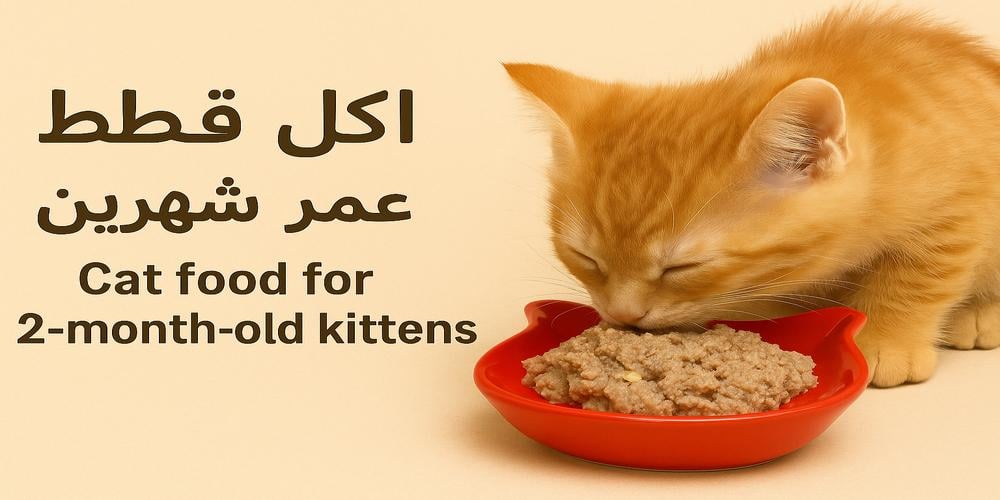Many families raising kittens in Saudi Arabia are interested in knowing the appropriate diet for them during the first months, as kittens are in a sensitive stage and need precise nutrition to help them grow properly. Therefore, the question is frequently asked among new breeders about what to feed two-month-old kittens and what foods can be safely offered at this stage. In this article, we explain the most important nutritional options suitable for this age, along with basic tips for daily care.
What is the food for two-month-old cats?
As kittens reach two months of age, their nutritional needs begin to gradually change as they become ready to try a more diverse diet compared to the previous stage, which focused on formula or semi-liquid foods. Although the most common question is "what to feed two-month-old kittens," the second month represents an important extension of establishing a healthy diet that helps support growth, immunity, and vital functions. Below are the most prominent types of foods that can be given to kittens at this age.
wet food for kittens
Wet kitten food is an excellent choice at two months of age, as it contains high levels of protein and moisture, is easy to chew and swallow, and many available types are fortified with the vitamins and minerals your cat needs at this stage.
Dry food for cats
Dry food for kittens can be introduced gradually starting at six to eight weeks of age, provided it is specifically designed for this early stage, as it contains the appropriate granule size and is easy to handle, in addition to a rich formula that supports growth.
Proper homemade food
If you want to provide homemade food, make sure the ingredients are suitable, such as boiled chicken breasts without salt or oil, or small amounts of mashed rice with a little natural chicken broth without any spices, taking into account the gradual introduction and continuous monitoring of the cat's health.
Understanding what two-month-old kittens eat helps the breeder make a smooth transition to the appropriate diet later on, avoiding digestive problems or nutrient deficiencies.
Types of food that are not suitable for two-month-old cats
Although kittens begin to experiment with a variety of foods as they get older, there are some foods that should be completely avoided at this sensitive stage because they may negatively affect their health or cause digestive problems.
Foods for adult cats
Adult cat foods contain varying proportions of protein and fat that are not appropriate for the needs of kittens. Also, the granule size of dry food may be too large for a two-month-old cat, making it difficult for it to eat and potentially causing digestion or swallowing problems.
food for dogs
Some breeders make the mistake of feeding dog food to kittens under the pretext of economy or availability, but the composition of dog food is completely different and does not contain the essential elements that cats need, such as taurine, an amino acid essential for growth and heart health in cats.
fatty or spicy foods
Any food containing oils, spices, or fatty ingredients, such as home-cooked meats high in fat, is not suitable for kittens and may cause stomach irritation, diarrhea, or vomiting.
Regular milk and dairy products
Contrary to popular belief, dairy products are not well digested by most kittens, especially cow's milk, which can cause digestive upset and should be replaced with cat milk substitutes if necessary.
Knowing what to feed two-month-old cats must be accompanied by being aware of what not to feed them, in order to maintain their health and avoid any nutritional problems during their early stages of growth.
Homemade food recipes for two-month-old cats
Many cat owners are looking for healthy and safe alternatives to convenience foods by preparing homemade meals that guarantee quality ingredients and are appropriate for the age of their kittens. Although the primary question when starting cat care is what to feed two-month-old kittens, introducing homemade recipes at two months old is an excellent step toward enhancing their nutrition, provided they are simple and easy to digest. Here are some recipes you can try:
Mashed Boiled Chicken Recipe
- Cook boneless, skinless chicken breast in clean water until fully cooked.
- Then mash it well and add a teaspoon of the boiling water to soften it.
- Serve warm and in small amounts throughout the day.
- This recipe is rich in protein, easy to digest and suitable as a starting point after weaning.
Rice with chicken recipe
- Boil a little white rice without any additives until it becomes soft.
- Then mix with a small amount of mashed chicken.
- It is preferable to have a higher ratio for chicken and a lower ratio for rice to ensure adequate protein.
- This meal is useful when gradually introducing additional ingredients to the diet.
Scrambled Eggs Recipe
- Beat whole eggs and cook over low heat without any oil or salt.
- Then mash it well and serve it in small amounts as an alternative protein source.
- It is preferable to offer it once or twice a week, not daily.
Tuna in Water Recipe
- Use tuna preserved in water without salt and drained well.
- Then mash and serve as a snack, not a main dish.
- It is best to use this meal as a kind of variety and not on a permanent basis.
Preparing safe homemade recipes helps diversify the diet of kittens after weaning and completes the correct understanding of the question of food for two-month-old kittens in a manner consistent with healthy growth in the second month.
Trappy Bites offers you the best food for two-month-old cats.
Complete Grain-Free Chicken Meal - Raw for Cats
Give your cat a delicious and healthy nutritional experience with Trappy Bites Complete Raw Chicken Cat Meal ! Rich in high-quality chicken meat and natural ingredients, this complete meal is designed to support the health of cats of all breeds and ages, providing optimal nutrition and lasting vitality.
- The meal contains 95.66% premium meat, with chicken as the main flavor to support growth and energy.
- Suitable for all ages: A balanced formula supports the health of cats of all breeds and at all life stages.
- Heart and Eye Health: Taurine bioavailable from the liver and organs promotes heart and eye function.
- Shiny Coat and Healthy Skin: Omega fatty acids from sardines protect against allergies and promote soft coat.
- Kidney & Urinary Tract Support: Naturally hydrating formula supports kidney and urinary tract health.
- Digestive Health: Soluble fiber from vegetables, pumpkin, and flax seeds regulates digestion.
- FREE OF HARMFUL INGREDIENTS: No grains, gluten, soy, corn, or preservatives, making it safe for cats with allergies.
- Locally Produced: Carefully prepared in the Trappy Bites kitchen in Dammam to ensure high quality.
Complete Grain-Free Duck Meal - Raw for Cats
Give your cat a premium nutritional experience with Trappy Bites ' complete, grain-free raw duck cat meal ! Enriched with high-quality duck meat and natural ingredients, this complete meal offers irresistible flavor and optimal nutrition for lasting vitality.
- High-quality protein: The duck meal in cat food contains 95.66% premium meat, with duck as the main flavor to support growth and energy.
- Suitable for all ages: A balanced formula supports the health of cats of all breeds and at all life stages.
- Heart and Eye Health: Taurine bioavailable from the liver and organs promotes heart and eye function.
- Shiny Coat and Healthy Skin: Omega fatty acids from sardines protect against allergies and promote soft coat.
- Kidney & Urinary Tract Support: Naturally hydrating formula supports kidney and urinary tract health.
- Digestive Health: Soluble fiber from vegetables, pumpkin, and flax seeds regulates digestion.
- FREE OF HARMFUL INGREDIENTS: No grains, gluten, soy, corn, or preservatives, making it safe for cats with allergies.
- Locally Produced: Carefully prepared in the Trappy Bites kitchen in Dammam to ensure high quality.
Knowing what to feed two-month-old cats is an essential step for every breeder who seeks to provide the best nutritional care for their kitten. Proper nutrition at this stage supports growth, enhances immunity, and reduces future health problems. It is important to choose a food that is suitable in terms of ingredients and texture, while diversifying between commercial meals and homemade recipes and avoiding everything that may cause harm or upset the digestive system. With the gradual introduction of foods and monitoring the cat's response, the breeder can lay a healthy foundation for a balanced diet that helps the cat grow safely.
Frequently Asked Questions
When does a kitten start eating?
The kitten begins to eat semi-solid food gradually from the age of three to four weeks in addition to breastfeeding. The food at first consists of mashed meals intended for kittens or simple home recipes of mashed boiled chicken. As the kitten reaches the age of one month, its need for external food increases.
When do cats start drinking water?
Kittens begin drinking water at the same stage they begin trying outside food, i.e., between three and four weeks of age. Once the kitten reaches one month of age, a clean water dish should be provided next to the food, as hydration is an essential element for healthy growth and is important for the health of the digestive and excretory systems. It is also necessary to ensure the provision of clean water throughout the day to ensure nutritional balance.

